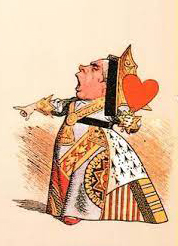Plague Journal, Believing Six Impossible Things
 “Alice laughed. ‘There’s no use trying,’ she said. ‘One can’t believe impossible things.’
“Alice laughed. ‘There’s no use trying,’ she said. ‘One can’t believe impossible things.’
I daresay you haven’t had much practice,’ said the Queen. ‘When I was your age, I always did it for half-an-hour a day. Why, sometimes I’ve believed as many as six impossible things before breakfast. There goes the shawl again!” — excerpt, Alice In Wonderland by Louis Carroll
I was taken to task earlier in the week by a friend who insisted that reasonable people do not believe in impossible things. She made her argument by describing the process whereby an individual, upon recognizing a contradiction subjects the matter to further examination, ideally by using the scientific method in order to eliminate the “impossible” and contradictory concepts.
My thought immediately was how incurably humans have believed what on the face were impossible things. The idea “resurrection” is a good example. The example is sensitive to mention, because today so many among us believe in the resurrection of the dead. We believe, not just the abstract idea, the possibility the second law of thermodynamics is upended by a supernatural force/influence/intervention to negate death and decay of the body, — but an actual future happening of what I have described.
It is understandable that our iron age ancestors would have found this plausible as the social atmosphere of their time was filled with stories of a hierarchy of gods, conflicts between divine personalities with consequences for the harvest, or for the outcome of a war, etc. The stories did not feature a hard boundary between life and death such as our principle of the conservation of energy, — the dead could return from Hades, the afterlife.
To belabor the point, our churches are filled on Sunday morning with worshipers who believe-that-they-believe in the resurrection from the dead.
Enough of this meditation. We humans are a paradoxical species, incurably irrational, — with occasional fits of rationality.
“There goes the shawl again!”
The tune suited for of topic of today is White Rabbit by Jefferson Airplane. I like the song. The lyricist, Grace Slick had insight into the human psyche.
White Rabbit
By Jefferson Airplane
One pill makes you larger
And one pill makes you small
And the ones that mother gives you
Don’t do anything at all
Go ask Alice
When she’s ten feet tall
And if you go chasing rabbits
And you know you’re going to fall
Tell ’em a hookah-smoking caterpillar
Has given you the call
Call Alice
When she was just small
When the men on the chessboard
Get up and tell you where to go
And you’ve just had some kind of mushroom
And your mind is moving low
Go ask Alice
I think she’ll know
When logic and proportion
Have fallen sloppy dead
And the White Knight is talking backwards
And the Red Queen’s off with her head
Remember what the dormouse said
Feed your head
Feed your head
Lyrics by Grace Slick
Slick said the composition was supposed to be a slap to parents who read their children such novels and then wondered why their children later used drugs. She later commented that all fairy tales read to little girls have a Prince Charming who comes and saves them. But Alice did not; she was on her own in a very strange place, but she kept on going and followed her curiosity – “that’s the White Rabbit”. A lot of women could have taken a message from that story about how you can push your own agenda. The line “feed your head” is about reading, as well as psychedelics feed your head by paying attention: read some books, pay attention. – Wikipedia